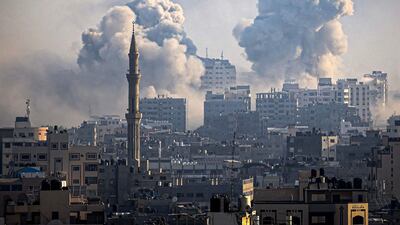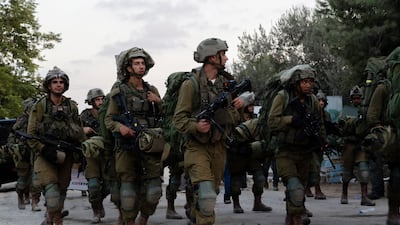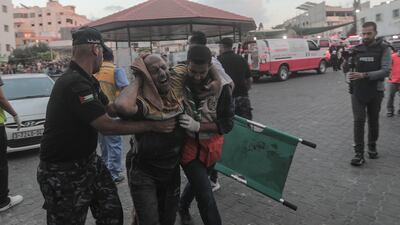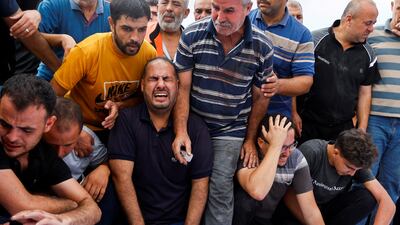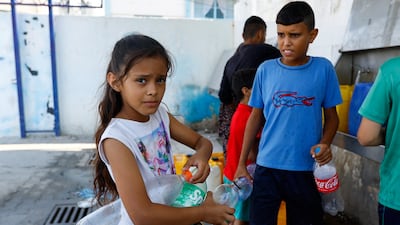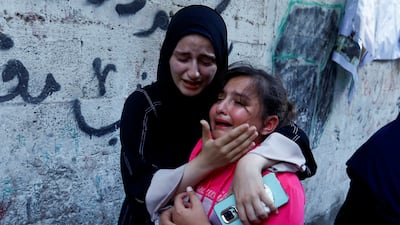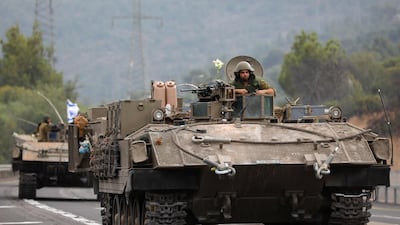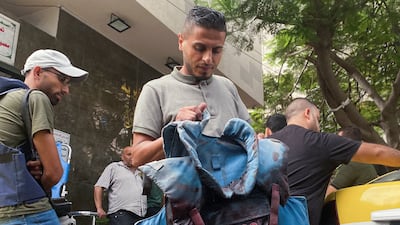Live updates: Follow the latest news on Israel-Gaza
“We were afraid to stay at home in case the bombs hit us – and we were afraid to move and be exposed to them,” said Abu Ali Al Zaeem, a resident of Gaza's Al Karama neighbourhood.
This was the dilemma facing Gaza residents desperate to leave their homes as Israeli warplanes targeted the area overnight on Tuesday.
Entire blocks lay reduced to rubble in Gaza on Wednesday morning.
Gaza officials said more than 1,200 people, including many civilians, have been killed in Israel's air and artillery strikes on the Palestinian enclave.
These followed the surprise attack by Hamas on Israeli settlements on Saturday. On Wednesday, the Israeli army said 1,300 bodies had been recovered, including many civilians.
In Al Karama, as midnight passed on Tuesday, people walked the streets, some shouting for ambulances, while others appealed for help.
Fathers held sleeping children tight, while mothers carrying only the bare essentials explained to their young sons and daughters why they had been taken from their beds in the dead of night.
Others waved down passing vehicles, desperate to escape the area and reach the centre of Gaza city and relative safety.
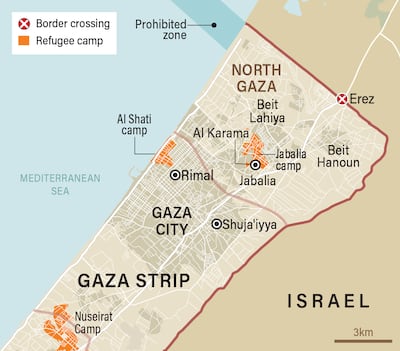
Resident Abu Ali said he could not contact relatives by phone as he tried to reach a safe place.
“It was horrible. The sound of bombing made me believe that survival would be a miracle,” he said.
Elderly and infirm residents had also to be evacuated.
“I couldn't go on foot, because my parents can't walk. They are old and sick,” Mr Al Zaeem, 48, who lives in the area with his wife, children and parents, told The National.
Two days previously, his brother who lives in Al Shati camp at the centre of Gaza, had moved to stay with him with his family, after his area was targeted.
Mr Al Zaeem asked his son and brother to take other family members and try to walk until they found a safe place, while he stayed with his parents.
“The heavy shelling paralysed everyone,” he said.
Despite their fears about going into the open, Mr Al Zaeem and his family eventually left their home under the bombardment.
Meanwhile, rescuers have told of the difficulties they face.
“Crews cannot operate well because Israeli warplanes are holding back our work and delaying us from answering calls for help,” Mohammed Al Moghaeer, a civil defence officer, told The National.
The targeting of Al Karama resulted in hundreds of residents being forced out of their homes. Many do not yet know if they will be able to return.
Malak Ismael, 45, held a bag of passports, certificates and other important documents belonging to her family members, as she loaded her children into their car.
“At the start of the war, I prepared a bag of essentials and asked my children to do the same. I put all the bags next to the door so it would be easy to leave immediately,” she told The National.
Her daughter Yasmeen, 25, held the family's cat in a velvet box, the terrified animal trembling at the sound of each bomb.
“It is a soul, I can't leave it behind,” Yasmeen said of her pet.


